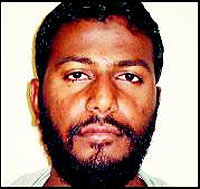 Mohammad Abdul Khwaja, the Harkat-ul-Jihadi cammander who arrest was made public in Hyderabad on Monday has turned out to be a prized catch for investigating agencies.
Mohammad Abdul Khwaja, the Harkat-ul-Jihadi cammander who arrest was made public in Hyderabad on Monday has turned out to be a prized catch for investigating agencies.
As investigations and interrogations continue, the police have stumbled upon vital clues. Khwaja rose through the ranks, becoming a HuJI commander following the death of his classmate Shahid Bilal, the mastermind of the Hyderabad twin blasts. Educated in a convent school in Hyderabad, Khwaja was one among the many youth who took to violence and terror, following the 2002 Gujarat riots.
Sources in the Intelligence Bureau told rediff.com that there were no traces of any sort of anti-national behaviour during his college or school days. It was in college at Anwar-ul-Uloom Degree College, Hyderabad that Khwaja first came in contact with Bilal. However the two of them, who became the most important persons in the HuJI's south Indian network, had no criminal records.
After college, Khwaja set up a shop selling mobile phones. Investigators say that the Gujarat riots proved to be a turning point for both Bilal and Khwaja. The regularly started to attend public meetings convened by influential clerics. Both Bilal and Khwaja then came in contact with a person named Junaid, who investigators believe influenced them to take up terror activities.
Khwaja also came in contact with Rasool Khan Party, who recruited volunteers to avenge the Gujarat riots. Rasool initially operated out of Gujarat, but after the police there stepped the heat up on him, he shifted
Rasool sent Bilal and Khwaja to Bangladesh, where they underwent training in the Chittagongh forests. The IB says that the two were sent to Pakistan, where they were asked specifically to focus on operations in south India. Apart from orchestrating several terror activities, both Bilal and Khwaja also focused on recruiting youth into their outfit. Prominent among them was Riazzuddin Nasir who currently is in the custody of the Karnataka police.
Nasir who claims that he was a victim of police atrocity was influenced into taking up jihad by Khwaja. Khwaja took a personal interest in Nasir and sent him to train with the Lashkar-e-Tayiba in Pakistan.
Although Khwaja's family claimed that he had plans on surrendering, the police maintain that he was in India to carry out terror strikes. They believe that his motive behind coming down to India was to disrupt the Republic Day celebrations in Hyderabad.
Khwaja's arrest has generated interest in the police forces all over southern India. The police believe that any person connected with Hyderabad would have a part to play in operation in the south. Khwaja is believed to have mobilised cadres in both Karnataka and Kerala. Meanwhile the Bengaluru police say that they would like to investigate Khwaja's involvement with the terror strike at the Indian Institute of Science.







 © 2025
© 2025